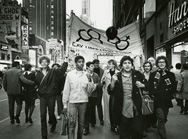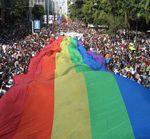Despite being treated by many today as a kind of taboo, homosexuality is more natural – or ancient – than it seems. The first known records date back to around 12 thousand years before the son of God came to Earth (who could also have been gay, why not?). They were cave paintings that portrayed the relationship between two men or two women. A homoerotic account from the XNUMXth century BC was also found. What can we say about the well-known stories from Ancient Greece, which attributed characteristics such as intellectuality, aesthetics and ethics to homosexuality, being more noble than a straight relationship? These are just to name a few examples.
Today, in the 40st century, we celebrate XNUMX years of Stonewall. A milestone in the fight for modern homosexual rights. And at the same time almost nothing, compared in age to previous records. Even so, we witness homophobic attacks, such as those that occurred at the São Paulo Parade. What could explain the non-acceptance of something that has already been proven to be older than Christ himself? In Brazil, for example, homophobia is not considered a crime nor is civil union between people of the same sex legal. Despite the persistence of some problems, it is more than fair to conclude that much has improved. And it can get even better. Let's look at some of the movement's achievements below.
Gay Parades – the first heritage
As Stonewall veterans reported to the website The Cape, being gay was definitely not something they could be proud of until the 70s. Not at least in public. Gays have always existed and will always exist, whether there is repression or not. But until 1969, everything was done in the dark. "Stonewall was the taking of the floor by homosexuals. The transition from the position of objects, from persecution, including by the police, to the position of subjects who wish to be recognized as such and stop being martyred by prejudice, by the abusive violence of others. Stonewall emerged in the epicenter of the sexual revolution of the 60s in which the watchword was freedom. The term 'gay pride' shows that before Stonewall, gays lived in bitterness and shame. At that point they came out of the closet – which is not a comfortable place. – and took to the streets", said psychoanalyst Marco Antonio Coutinho Jorge during a colloquium on the subject at the Veiga de Almeida University, in Rio de Janeiro.
During this period, the emergence of the first LGBT organizations and the first gay pride parade began in New York. Yes, now being gay was no longer a matter of nature. It was also a matter of pride. Since then, the event began to be celebrated in several countries. Brazil is the country with the record for the number of Parades – 127 in 2008 alone. We also host the biggest of all, in São Paulo, which, not by chance, takes place in the month of June. It was at this time, according to Glória Sadala, that the term "gay" emerged. "It was an attempt to erase the psychiatric content contained in the word homosexual, created in 1869 by the Austro-Hungarian journalist writer Karoly Maria Benkert. Therefore, gay is a politicized term, linked to the defense of human rights", said the psychoanalyst who also participated in the colloquium in Rio.
Homosexuality: from illness to normality
Well accepted in antiquity, it was in the period of Christianity, however, that the situation began to reverse, even though gays were in monasteries and military camps. Treated as a perversion, homosexuality has been the subject of several studies since then, such as that of the English scientist George V. Hamilton, who even researched it in primates. There were also several attempts to try to cure it. Treatments included hospitalizations in clinics that applied electric shocks and even lobotomies. Fortunately, no one was cured.
With the emergence of psychoanalysis, based on the ideas of its Father, Sigmund Freud, this tortuous path timidly began to take its course towards depathologization. Freud would have said that every being, in essence, is bisexual. His maximum work in which he discusses the subject is the book "Three Essays". "There is no consensus among analysts on homosexuality. Any theory that generalizes it is false, prejudiced and opens the way to discrimination and, when not, eugenics. There are patent, latent or sublimated homosexuals. Freud even raised the question of homosexuality as mystery", said Doctor of Philosophy Antonio Quinet.
In the 40s, another revolution: Dr. Kinsey, an American sexologist, created the Kinsey scale, suggesting that our behavior could vary from extremely straight to extremely homo. Finally, in 1973, the American Psychological Association removed homosexuality from the list of psychiatric illnesses. The World Health Organization would do the same in 1990. Another recent and significant advance in the field of health, at least in Brazil, was the decision by the SUS to perform sex change surgery as of 12/12/2007.
The fight for rights and civil union
An important field that needs to advance a lot is legal. Civil unions between people of the same sex are one of the most discussed topics when it comes to homosexual rights. Few countries today fully recognize it. Still, it is a big step and can serve as an incentive for other nations to do the same. This is the case of Spain, Canada and Belgium. Countries such as the United States (state of Massachusetts) and Argentina (city of Buenos Aires) partially recognize this type of union.
On the other hand, Iran and other colleagues who worship Islam are far from achieving any progress: homosexuality is harshly repressed and can lead to the death of its "practitioners". In Brazil, the union project has been stuck since 1995, when it was created by then deputy Marta Suplicy. Timidly, the situation begins to change in some aspects. Some private companies already accept, for example, the inclusion of a partner as a dependent in the health plan. Another pertinent issue is the adoption of children. The first official case in the country occurred in 2006, when Theodora, then 5 years old, was adopted by Vasco Pedro da Gama and Júnior de Carvalho, 38 and 46 years old respectively at the time, from Rio Grande do Sul. The decision was given by judge Sueli Juarez Alonso, from the 2nd Criminal Court for Children and Youth of Catanduva, in the interior of São Paulo. Until then, only Vasco was considered the father of little Theodora. Three years later, several couples have managed to adopt and gain custody of their biological children from a former heterosexual marriage.
Media visibility and Pink Money
Although to date there has not been a gay kiss in Brazilian soap operas, the subject is not new in countries like the United States and England. Gays are in several series and other TV programs and are not necessarily portrayed as mere stereotypes. They kiss, they have sex, in short, they do whatever they want. As in the successful series "Queer as Folk" – here in Brazil with translation of "Os Assumidos" and shown without fanfare on TVA. Gays are still in advertisements and even presenting on television news, like journalist David Cooper, from CNN.
The former aberrations today also seem to be the salvation of many who are beginning to see gays as a very profitable consumer market. According to the book "The GLS market", by Franco Reinaudo and Laura Bacellar, "pink money" has the potential to generate R$111 billion per year. No less than 18 million Brazilians declared themselves gay, that is, 10% of the population. Of this total, 47% are class B and 36% are class A. And none of them tend to cut corners when it comes to quality. Not that queers are rich, but in the absence of children and other commitments, they spend 30% more than a straight couple. Furthermore, homosexuals, in general, have sophisticated taste, placing more value on expensive objects, such as clothes, watches and other branded accessories. There are websites, specialized magazines, in short, a range of products that are beginning to emerge to meet the needs of this audience.


